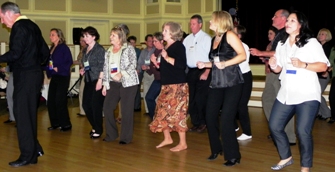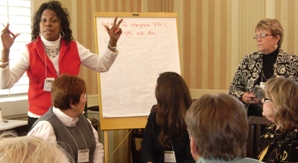| Meet Catherine Crock, MD ~ Australian Pioneer for Patient- and Family-Centered Care |

Dr. Catherine Crock is a mother of five who has raised more than $850,000 through the sale of music she uses to help children awaiting surgery. She is both the doctor in charge of a day-operating theatre at the Royal Children's Hospital, Melbourne, Australia, and the producer of the music that plays there. Dr. Crock also teaches medical students and residents how to perform bone marrow aspirates and lumbar punctures. As part of her teaching methodology, she conceptualized, wrote the “screen play” for, and directed a video with oncology patients and their parents as the actors, to explain outpatient bone marrow procedures and lumbar punctures. Cathy was instrumental in organizing music and play therapy to relax and distract patients while they waited for procedures. But she didn't stop there; she convinced friends from classical and jazz music circles to perform on CDs–and oversaw their production and promotion. The result is read more.....
|
| Guide to Patient and Family Engagement |

In September 2009, the Agency for Healthcare Research and Quality (AHRQ) awarded a multi-year contract to a team of organizations led by the American Institutes for Research to develop, evaluate, implement, and disseminate a Guide to Patient and Family Engagement. The Institute serves as one of the organizational partners on this team. See Pinwheel Pages, January 2010. The purpose of this project is to build a comprehensive resource to help patients, families, health professionals, and hospital leaders work together to improve hospital quality and safety. This project aims to build and expand on existing efforts to facilitate patient and family engagement through the creation of evidence-based guidance and tools that can help create a foundation for change in organizational culture.
In the first year of this project, a team of writers and editors developed tools and materials intended to: - support the involvement of patients and family members in ensuring the safety and quality of care at multiple points during the hospital stay,
- encourage the involvement of patients and family members as organizational-level advisors in improving hospital quality and safety,
- help create collaborative partnerships between health professionals and patients / family members, and
- provide guidance to hospital leaders and outline the steps needed to implement changes.
Over the first year, a variety of individuals and organizations contributed their input and feedback to the Guide materials.This included ongoing review from six patient and family advisory council from diverse provider organizations: - MCGHealth, Augusta, GA;
- Evans Army Community Hospital, Ft. Carson, CO;
- Memorial Regional Hospital, Hollywood, FL;
- MultiCare, Tacoma, WA;
- Perham Memorial Hospital and Home, Perham, MN; and
- University Health Systems of Eastern North Carolina, Greenville, NC.
The councils reviewed materials to provide substantive feedback and ensure that the materials are practical, user-friendly, and culturally relevant.
Next steps include further testing of the materials along with implementation and evaluation in several hospitals. Stay tuned for more developments on this exciting project. * * * * *
The Agency for Healthcare Research and Quality recently published a notice of its intent to seek approval to collect information for Guide to Patient and Family Engagement in Health Care Quality and Safety in the Hospital Setting. Comments on this notice must be received by January 14, 2011. See 75 FED REG 69674 (NOVEMBER 15, 2010).
|
| North Carolina Seminar a Great Success |

The North Carolina Hospitals and Communities Moving Forward with Patient- and Family-Centered Care intensive training seminar registered 431 participants, including 166 nurses, 51 physicians, 78 patient/family leaders, and numerous other professionals. The seminar attracted participants from 131 organizations, 34 states, and three countries. A new invitational Leadership Track for CEOs, VPs, CNOs, CFOs, and Medical Directors, sponsored by North Carolina Hospital Association Strategic Partners, provided an opportunity to address the role of senior executives in promoting patient- and family-centered change in organizational culture. Jim Conway, Senior Fellow at the Institute for Healthcare Improvement and Jim Anderson, former President and CEO of Cincinnati Children's Hospital Medical Center, discussed strategies for developing partnerships with patients and families based on their experiences. We were delighted that more than 100 senior executives joined us for the entire seminar. A highlight of the seminar was the Patient Panel, facilitated by faculty member Marlene Fondrick. These patient leaders, representing University Health Systems of Eastern Carolina, shared helpful and heartfelt recommendations to improve the experience of care. For many health care professionals, it was the first time they had really seen how patients could make such an impact. During the panel, Marlene also shared key points to effectively facilitate a panel so seminar participants could replicate this as a way to partner with patients and families in their own organizations.
In addition to large plenary sessions, small groups met in every nook and cranny of the Carolina Hotel at the Pinehurst Resort. Along with their faculty advisors, each group developed individualized Action Plans to take back to their organizations with key steps in getting started with or enhancing ongoing patient- and family-centered care initiatives. But, it wasn’t all work—participants and faculty learned the North Carolina Shag line dance during the Low Country Boil buffet dinner.

A special thanks to University Health Systems of Eastern Carolina, North Carolina Center for Hospital Quality and Patient Safety, and UNC Health Care System for their leadership support!
Here are some comments from participants:
"I have no words to express...the wealth of knowledge and motivation gained by attending this intensive seminar!"
"Very informative, enlightening, thought-provoking on how to better our unit/hospital...the seminar gave such great real life examples of how to improve patient care."
"This seminar changed the way I look at this topic...I now have concrete examples of how change can occur."
"...Coming as a large team [allowed us to]... bounce ideas off each other with a common background [and have]...the opportunity to bond as a leadership group... this will be important to our future success."
This seminar was very valuable. We had a few senior leaders attend that could finally say that they 'got it'...."
"Wonderful, mind dizzying, humbling, challenging and......can't wait—let's get moving!!!" 
|
|
 |
| Families as Educators: Guidance for Implementation |

The Initiative for Pediatric Palliative Care (IPPC) is a broad-based collaborative initiative of several organizations and a number of leading children's hospitals. The IPPC works to educate and improve quality of care to enhance patient- and family-centered care for children living with life-threatening conditions. The IPPC offers free resources on its website, including it’s curriculum, and a variety of tools.
IPPC educational retreats introduce interdisciplinary teams—including a significant number of family members—from a variety of health care settings to the IPPC curriculum and prepare the teams to lead educational and organizational change. The retreats incorporate family members to participate as co-teachers and co-learners with health care professionals. Families as Educators: Guidance for Implementation—available as a free download—provides practical guidance to help other institutions understand this model and adapt it to their own settings. The Kenneth B. Schwartz Center supported the Families as Educators component of IPPC with four years of funding.
|
| Most Wired Hospitals; U.S. News & World Report's Best Hospitals |

The July 2010 issue of Hospitals & Health Networks (H&HN) released the list of the Most Wired Hospitals and Health Systems. This year’s survey recognized achievements in four areas: infrastructure, business and administrative management, clinical quality and safety, and the care continuum. The 2010 survey included new and revised questions on the concept of meaningful use. Check to see which of the Institute’s Pinwheel Sponsors are on the 2010 List.

The annual U.S. News & World Report ranking of the country’s elite medical centers is a tool for patients who need medical sophistication most facilities cannot offer. The hospital’s “ability to take on and meet the most difficult challenges” is the special quality shared by the hospitals on the list. Johns Hopkins Hospital tops the Honor Roll list, as it has every year since 1991. See the 2010-2011 Honor Roll. Also check out the separate rankings for the Best Children’s Hospitals. Four of the top 14 hospitals on the Honor roll, and eight of the 10 Best Children’s Hospitals, are Institute Pinwheel Sponsors. Congratulations to all on the lists. Read more...
Final Rule Requires Equal Visitation Rights for All Hospital Patients
The Centers for Medicare & Medicaid Services (CMS), U.S. Department of Health and Human Services, issued a final rule for hospitals participating in Medicaid and Medicare to protects patients’ right to choose their own visitors during a hospital stay. A key provision of the rules specifies that all visitors chosen by the patient (or his or her representative) must be able to enjoy “full and equal” visitation privileges consistent with the wishes of the patient.
According to CMS Administrator Donald Berwick, MD, MPP, this rule makes "it easier for hospitals to deliver on some of the fundamental tenets of patient-centered care—care that recognizes and respects the patient as an individual with unique needs, who is treated with dignity and granted the power of informed choice.” Read more... |
|







